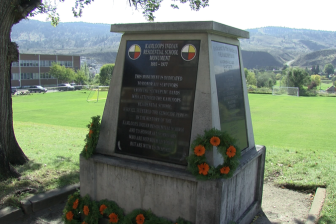Sixty-two per cent of Albertans want the provincial government to increase coverage of Indigenous history in the school curriculum, according to a survey by the Canadian Race Relations Foundation, the Assembly of First Nations and Abacus Data released Thursday.

The poll results come as calls grow for more searches of residential school grounds to find unmarked burial sites and the province faces criticism from the Alberta Teachers’ Association and education experts over the “whitewashing of history” in the proposed K-6 curriculum, the CRRF said.

‘Extremely negative perceptions’
Nearly one in five Albertans say they know nothing about the residential school system.
“The most difficult thing to watch in our communities is the continuous effects of residential schools,” said Iitoomsaokaa’sii Diandra Bruised Head of the Kainai Blood Tribe Council in a news release.
“It’s isolating knowing that the majority of Albertans, for whatever reason, did not know of these horrible institutions.
“This lack of education has led to some extremely negative perceptions of First Nations people.”
CRRF said the proposed curriculum is Eurocentric, focused on the fall of Rome and artists like Pablo Picasso and Claude Monet.
“The new curriculum fails to put a critical lens on Canada’s colonial past and does not underscore the cultural and historical contributions of the many racialized and immigrant communities in the country,” the CRRF said.
“This is particularly evident in the lack of detail included in the curriculum about the legacy of residential schools, of which Alberta was home to at least 25.”
‘Alarming gaps in knowledge’
The horrific discovery of 215 Indigenous children’s remains in unmarked burial sites in Kamloops, B.C., on May 27 has “exposed alarming gaps in knowledge among Canadians,” the CRRF said.
According to the survey:
- seven out of 10 Albertans were saddened by the news
- nearly half were angered by it
- 62 per cent of Albertans were either shocked by it or had no idea about the extent of abuse
“For Canada to move forward in the spirit of truth and reconciliation, educational systems regionally must be better equipped to teach Indigenous history,” said CRRF board member and Métis activist Roy Pogorzelski.
“This is a time for non-Indigenous people to act in meaningful allyship with Indigenous communities while we continue to work towards eliminating anti-Indigenous racism by breaking down racist systems and institutions that have been maintained in this country for generations.”

Demographic differences
The survey had some disparities along demographic lines.
Four in five southern Alberta residents believe that not enough is being taught to students about the history of the residential school system. Only half of northwestern Albertans feel the same way.
Seventy-nine per cent of Alberta residents between the ages of 30 and 44 believe that the history of residential schools was understated in the school curriculum.
Nearly 60 per cent of Albertan women believe that residential schools were an instrument of genocide, while only half of Albertan men are convinced of that fact.
“The work to redraft the Alberta curriculum, with an Indigenous lens, has fallen into the wayside only to be ignored,” said Lawrence Gervais, president of the Métis Nation of Alberta, Region 3.
“Our hope is that Albertans will discover the true history of Canada and honour the Métis who were affected by the residential school system. We are still feeling its impacts. We honour the 215 plus.”
Add to that the “horrific and shocking discovery” about unmarked burial sites at the former Marieval Indian Residential School that will be announced on Thursday, according to the Federation of Sovereign Indigenous Nations and Cowessess First Nation in Saskatchewan.
“The number of unmarked graves will be the most significantly substantial to date in Canada,” a news release from the FSIN said Wednesday.
Survivors of the residential school system can get support through Canada’s Indian Residential Schools Resolution Health Support Program 24-7 crisis line by calling 1-866-925-4419.
The survey was conducted with 463 Albertan adults between June 4 to 8, 2021. A random sample of panellists was invited to complete the survey from a set of partner panels based on the Lucid exchange platform. These partners are typically double opt-in survey panels, blended to manage out potential skews in the data from a single source.
The margin of error for a comparable probability-based random sample of the same size is +/- 4.6, 19 times out of 20.
Results were weighted according to census data to ensure that the sample matched Alberta’s population according to age, gender, educational attainment and region.




Comments